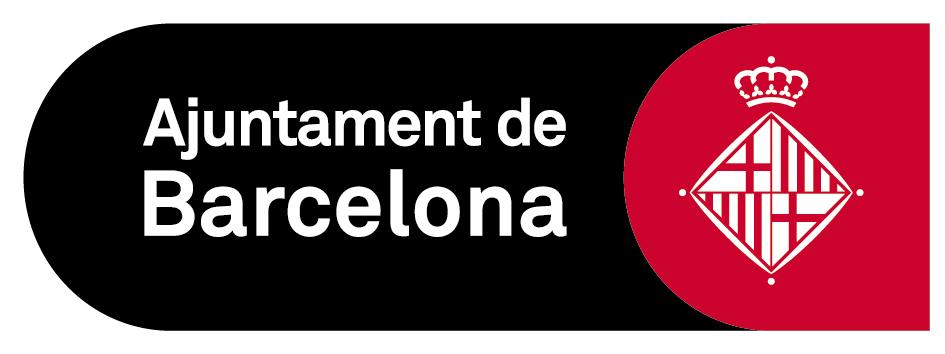Dossier
Blossoming life amid frozen conflict: Karabakh women
Full-scale war broke out which ended in 1994 with a ceasefire agreement between Armenia, Azerbaijan and Nagorno-Karabakh. Despite the fact that Nagorno-Karabakh is internationally recognized as a part of Azerbaijan, it is currently governed by the Republic of Artsakh, which is closely linked to Armenia. The OSCE Minsk Group, co-chaired by the USA, France, and Russia, is mediating negotiations between sides of the conflict.
Since then, both Armenia and Azerbaijan recorded ceasefire violations. And in 2016 a new war erupted, which is known as the April War or Four-Day War. According to the Armenian side, Armenia lost control of 800 hectares, but Azerbaijan claims that it is actually 20,000 hectares.
Borders are closed between Armenia and Azerbaijan. And citizens of both countries can meet only in third countries, most commonly in neighboring Georgia. Azerbaijan declares internationals who visit the territory of Nagorno-Karabakh as personae non gratae and ban entries of these people to Azerbaijan.
“Suffering does not have a nationality”
Vera Grigoryan has been waiting for her son for 26 years. The last time she saw her son was on January 6, 1994. Her son, Spartak Grigoryan, was declared missing after 10 days on January 16, 1994. Since then, Vera Grigoryan started to collect information not only about her son but also about other missing freedom fighters and civilians. According to her, there are 773 missing ones from Nagorno-Karabakh.
Together with other parents, Vera was participating in meetings and negotiations with different local and international institutions like the National Security Service, the Red Cross or the Ministry of Internal Affairs in order to find out information about her son. She recalls every single demonstration, meeting with details, remembers the names of officials that she met and introduced her situation to. “They [Azerbaijani officials] were telling us that we were going to exchange all the prisoners of war. We believed them, alas,” says Vera.
Vera, together with other parents, decided to unite and formed the Union of Relatives of Missing Freedom Fighters so that they can act in a more organized way. As the head of the Union, Vera traveled to the provinces of Nagorno-Karabakh to meet with all the inhabitants and to collect information about missing freedom fighters.
“It’s very hard, we don’t know any information about our sons. We don’t know whether he is a prisoner of war or what actually happened to him. We live in uncertainty. Every night I leave my front door open waiting for Spartak to return,” tells Vera, adding that she is afraid of only one thing. “If my son returns and asks where his wife is, what am I going to answer?” Vera thought about this conversation many times. When Spartak was missing for already 5 years, they decided to let his wife go and get married. And now sometimes she feels guilty and does not know how she is going to explain the situation to her son.
Vera Grigoryan also participates in international events where she can meet mothers of missing people from Azerbaijan. “The first time it was very hard,” recalls Vera. She met in Bulgaria with Tamara Ayibova. Vera took a radio receiver and a candle with herself. “I gave it to her and said, ‘let this receiver help you to hear news about your missing relatives. And light this candle for peace.’ And mothers from Armenia, Azerbaijan, and Nagorno-Karabakh hugged each other and started to cry. She is a mother like me. Suffering does not have a nationality.”
Women’s club
Alla Arzumanyan was in her twenties when the Karabakh Movement started. Despite threats and danger, she continued participating in demonstrations. “Our main aim was the union with Armenia. I started a petition despite the threats that I may get arrested.”
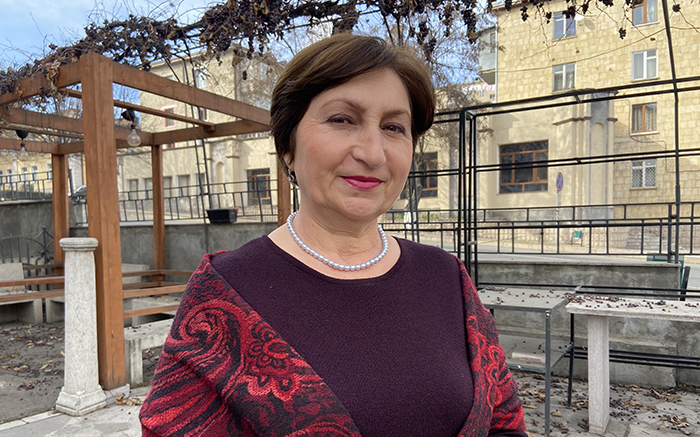 Alla Arzumanyan. / Photo: Ami Chichakyan.
Alla Arzumanyan. / Photo: Ami Chichakyan.Their cooperative owned a restaurant which soon became a meeting place for freedom fighters. Alla got to know them there, and when they decided to form groups, she joined them and served as a riflewoman leaving her daughter with her mother. “It was really hard for me, as I was a single mother. But I didn’t have another choice.”
Soon, one of the commanders noticed her and invited her to their detachment to serve as a nurse. There she could combine both helping the injured and fighting. “Women contributed more to the war. Some of them fought and served as nurses, others just stayed and brought up their children. If there were no women, the war would have been monotonous. When there are women in the frontline, men feel sober and more serious.”
When Alla returned, she found their restaurant was burned. She decided to rebuild it as she wanted to continue her life nowhere else than in her hometown. Alla wanted to create a bright future for her daughter and she believes she succeeded. “I returned from the war thinking that there wouldn’t be any war again. We have won, and everything will be better from now on.”
This time the restaurant Mayrik (Mother) was turned to another hub —a women’s club. Initially, Alla invited her neighbours, and they discussed their daily lives, problems, and challenges that women face. More and more women were interested in the initiative and they formed a club. Local organizations became interested in the activities of the club and organized a series of training there. They helped women to overcome post-war traumas and taught them how to start a business and how to promote it on social media. This motivated 20 out of 45 women to start their businesses: some of them have B&Bs (bed and breakfast), others produce dried food, pomegranate juice and sell it. “At first it was hard for women to understand those difficult words. But after some time they were involved in an active discussion,” says Alla noting that the most successful training was about agriculture. “We couldn’t even imagine that they would be so interested in the topic. Now we have to organize another one. I hope more and more women can find their passion, have an income out of it and become more independent.”
“Women need to be taken seriously as Armenians believe that the woman is the guardian of the hearth. She is a housewife and has to give birth to children and bring them up,” tells Alla, noting that women in Nagorno-Karabakh are not weak: they just need some assistance. “They need courage. If someone starts or helps them to start, they are ready to do everything and come up with new ideas.”
Women trying to break stereotypes
The number of women involved in Nagorno-Karabakh’s politics has declined. Now there is only one female minister and five members of parliament. Last year, not a single woman was elected as a member of Stepanakert City Council, the capital city of Nagorno-Karabakh. And now, Kristin Balayan decided to run for the presidential election that is scheduled for March 31, 2020.
Kristin plans to organize women’s clubs in the provinces of Nagorno-Karabakh. This will help to understand what problems local women have, and try to find solutions for them. “Women are mostly under pressure in villages. But I can’t say that there is a strong violation of women’s rights,” notes Kristin, telling that there are cases of violence against women, but they generally prefer not to report to the police. “It is not acceptable in our society. Women don’t want others to know about their personal problems. They don’t want to report to the police either because of our traditions as they think they will be dishonored and society will judge them.”
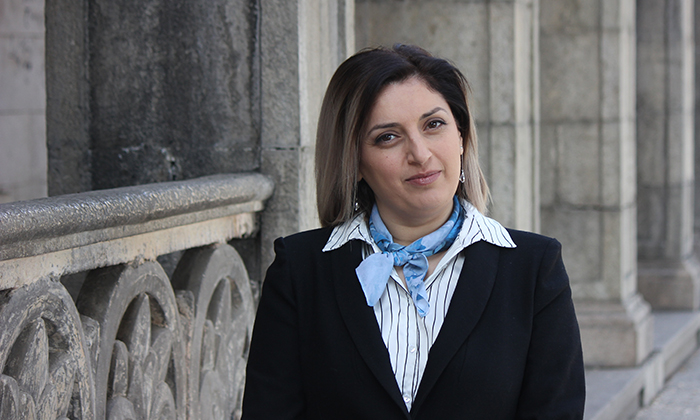 Kristin Balayan. / Photo: A. C.
Kristin Balayan. / Photo: A. C.Kristin Balayan believes that women are becoming more active, and hopes that she is serving as an example and after the presidential election, women will be bolder and more open. “It was painful for me that female candidates lost the [Stepanakert City Council] election, I was certain that they could make a change in our city,” tells Kristin. She studied the society’s reaction to her candidacy, and was surprised to discover that most women are against a female candidate. “I figured out that our society is not ready for a female leader. Men are more open to that idea than women. At this point, I’m not sure why. But we are breaking the stereotypes and we are going to break those stereotypes until the end.”
She thinks that Nagorno-Karabakh needs a strong leader, a leader who can resist temptations and understand the seriousness of the situation. “It is a huge burden, but women are strong. And I am convinced they can accomplish that role,” says Kristin.
Women getting more involved in IT
Astghik Mirzoyan dreamed about becoming an information technology (IT) professional since third grade at school. During the informatics class, she first learned how to use different programs on the computer. There was no internet connection in their village so she did not have an opportunity to learn more online. After graduation, she moved to Stepanakert and entered the Artsakh State University, the faculty of Cybernetics and Applied Mathematics. “It was very hard. I didn’t have much information about my profession. I didn’t have a full idea of what it was. I had to learn a lot at once in order not to fall behind,” tells Astghik.
IT is a male-dominated industry, and Astghik was one of only two girls in their faculty. Lecturers were also men. “It was challenging to learn in that environment as you always have to prove that you also can do it and you also can have success in your profession,” recalls Astghik, adding that now more and more women are interested in IT professions and gender imbalance is decreasing.
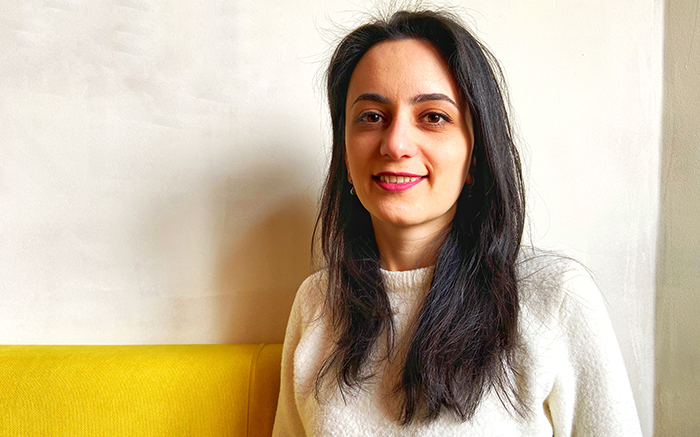 Astghik Mirzoyan. / Imatge: A. C.
Astghik Mirzoyan. / Imatge: A. C.While studying at university, Astghik learned about a job opportunity at the TUMO Center of Creative Technologies. Here, teenagers aged 12-18 can learn 3D modeling, robotics, animation, filmmaking, photography, creative writing, game development, and web development for free. The first TUMO center was opened in Yerevan, the capital of Armenia. Currently, there are 4 centers in Armenia and Nagorno-Karabakh, and two international ones in Paris and Beirut. “I didn’t have an opportunity to study in TUMO, so I couldn’t imagine what it was, but I decided to give it a try,” tells Astghik emphasizing that while working there as a trainer you can see the results of your work in a couple of years. “You follow the achievements and failures of your students, you see how hard they try. And when you finally see them succeed and choose their profession, then you understand the importance of your work.”
The majority of TUMO students are from Stepanakert but there are also teenagers from villages. Sometimes they need to spend two hours just to get to the center. It’s more difficult for girls, as their families do not allow them to stay that late outdoors, and sometimes it becomes a reason to drop out of the center. But she is convinced that more and more girls are interested in IT and they try to adjust the classes so that everyone can attend. “It’s very important as they enter this environment of TUMO apart from their school. Sometimes it can be challenging for them because they have self-doubts and many things are new for them. It’s our job to encourage and inspire them, and make them believe they can try new things,” notes Astghik, mentioning that students from villages should be stronger and study harder not to face the problems that she had once faced when she moved from her village to the capital.
Society judging successful women
While studying International relations in Yerevan, Irina Safaryan started to edit articles on Wikipedia. She wanted to improve and enrich the Armenian Wikipedia as she was doing translations at that time. She met with the Wikimedia Armenia president and the staff and asked them to teach her how to properly edit the articles. After graduation, Irina wanted to return back to her motherland. Meanwhile, she wanted to make a change there. At that time, she was suggested by Wikimedia Armenia to coordinate the Wikiclub (Wikipedia club) in Stepanakert and she was more than happy to accept that offer.
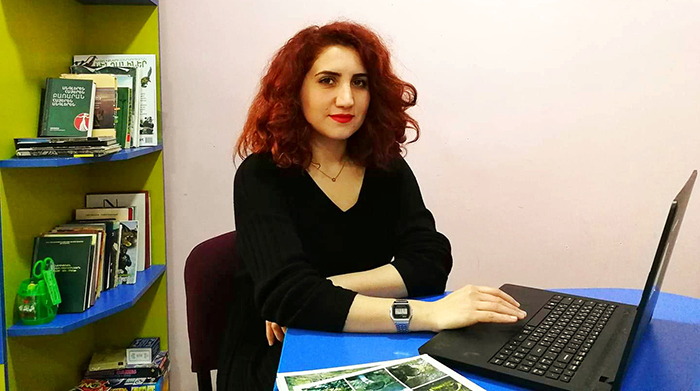 Irina Safaryan. / Imatge: A. C.
Irina Safaryan. / Imatge: A. C.The Stepanakert Wikiclub was thus founded in 2015 when only 3 individuals gathered in one place and started editing the Wikipedia in Armenian. At first, they didn't even have an office. And they were gathering in the Palace of Culture, which offered them coworking space for 1-2 hours. After a year, they were given a space where Irina meets teenagers and their parents who want to learn how to edit articles. In the beginning it was hard for Irina to explain to the parents why their children should come and edit the articles as volunteers. Shortly after, parents themselves realized the advantages and importance of the club. Teenagers learn new things, master their typing skills, and have the opportunity to participate in Wikicamps. “In 2017 our team of 11 members participated at the Winter Wikicamp. It was a dream for me that children from Artsakh could take part in one of those camps, could learn what Wikipedia is, what is a Wikicamp and could meet with the community,” says Irina.
They write and edit articles mainly in Armenian and mostly about Nagorno-Karabakh. The Stepanakert Wikiclub has already edited more than 3,000 articles and has more than 260 members. 30 to 40 of them are active members who edit articles regularly. Following the success of the club in Stepanakert, two more Wikiclubs were opened in the Togh village in the Hadrout region and in the Karvachar region.
Irina has succeeded to participate twice at Wikimania, the annual conference celebrating all the free knowledge projects hosted by the Wikimedia Foundation. The first time was in 2018 in Cape Town, South Africa. The second, in 2019 in Stockholm, Sweden. The Embassy of Azerbaijan wrote a letter of complaint to Wikimedia Sweden as they were concerned about the participation of a representative from Artsakh. “I want to show that we are working and living peacefully. I never make bellicose statements. We exist, we live, we love and we work peacefully,” says Irina, adding that she did not want someone to question her participation because of the unresolved conflict. “If someone is active in Artsakh, s/he is under the Azerbaijani government’s target. But knowing that fact does not make us afraid of it. We continue our job and represent our country abroad.”
At first, people did not believe that an independent young woman could have success. From time to time Irina was often asked: “Who is your father that you have managed to find your job?”. “People should understand that a self-confident woman can be assured because of her knowledge, her experience, and skills. And she does not need a patron to achieve something,” notes Irina. She believes that women’s rights are not actively violated in Nagorno-Karabakh, but in her opinion women need to be bolder and not afraid to raise their problems and thoughts. “I like to repeat that, in Artsakh, men need to be emancipated more than women. Artsakh is famous for its matriarchy. Women just need to support each other, we need to help each other realize that someone believes in us and we can do it.”
With support from:

